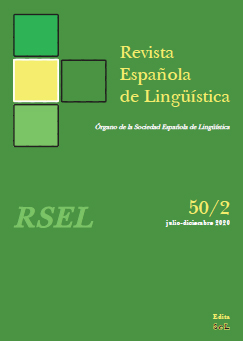On participles and adjectives. Constructions with verb+bien+pp/a
https://dx.doi.org/10.31810/RSEL.50.2.8
Keywords:
Bien PP/A modifier; resultativity; manner modification; argument structure.Abstract
This paper explores what we have named the <Verb + bien + Past Participle/Adjective> construction. These structures have been discussed in Bosque 1989 as «cognate participle constructions»: secar los platos bien {secados ~ secos} «to dry the dishes well ~ off». Drawing from the discussions about resultativity, the distinctions between manner and result readings, and the interpretation of bien as an indicator of maximal degree, an analysis of these sequences is postulated from a neoconstructionist approach that accounts for two aspects: (1) the presence of the constituent <bien + PP/A> is not responsible for the result reading where that interpretation is available, and (2) the manner/result readings not only arise from different merge positions in the main structure of the constituent <bien + PP/A>, but also from the type of projection quantified by bien (Voice* or Place). The tests used to advance this analysis allow for the clear identification of the main differences between these constructions and the levels of modification where the past participle form is the only option available.
Downloads
References
Acedo-Matellán, V. (2016): The morphosyntax of transitions: A case study in Latin and other languages 62, Oxford, Oxford University Press.
Acedo-Matellán, V. y Mateu, J. (2013): «Satellite-framed Latin vs. verb-framed Romance: A syntactic approach», International journal of Latin and Romance linguistics 25, 2, pp. 227-265.
Armstrong, G. (2012): «On the adjectival component of change of state verbs in Spanish», en Cuervo, M. C. y Roberge, Y. (eds.), The end of argument structure, Londres, Emerald Group, pp. 13-41.
Borer, H. (2005): The normal course of events. Structuring sense, Vol. II, Oxford, Oxford University Press.
Bosque, I. (1989): Las categorías gramaticales. Relaciones y diferencias, Madrid, Síntesis.
–,(1990): «Sobre el aspecto en los adjetivos y en los participios», en Bosque, I. (coord.), Tiempo y aspecto en español, Madrid, Cátedra, pp. 177-214.
–, (2014): «On resultative past participles in Spanish», Catalan journal of linguistics 13, pp. 41-77.
–, y Gutiérrez-Rexach, J. (2009): Fundamentos de sintaxis formal, Madrid, Akal.
Demonte, V. (1991): «Temporal and aspectual constraints on predicative adjective phrases», en Campos, H. y Martínez-Gil, F. (eds.), Current studies in Spanish linguistics, Washington, DC, Georgetown University Press, pp. 165-200.
Demonte, V. y Masullo, P. (1999): «La predicación: los complementos predicativos», en Bosque I. y Demonte, V. (dirs.), Gramática descriptiva de la lengua española, Madrid, Espasa, pp. 2461-2524.
Di Tullio, Á. (2002): «La lábil frontera entre los participios y los adjetivos sufijados en do», Ms., Universidad Nacional del Comahue.
Dibo, S. y Mare, M. (2019): «Verbo + bien + participio/adjetivo. Un abordaje neo-construccionista para pensar la traducción», en Espinosa, G. y otros (eds.), Conocimiento y diversidad en el estudio y la enseñanza de lenguas, Universidad Nacional del Comahue, pp. 157-172.
Dowty, D. R. (1979): Word meaning and Montague grammar, Dordrecht, Reidel.
Embick, D. (2004): «On the structure of resultative participles in English», Linguistic inquiry 35, 3, pp. 355-392.
Espinal, T. y Mateu, J. (2018): «Manner and result modifiers. The V ben V construction in Catalan», The linguistic review 35, 1, pp. 1-33.
Gehrke, B., y Castroviejo, E. (2016): «Good manners: On the degree effect of good events», en Proceedings of Sinn und Bedeutung 20, pp. 252-269.
Gutiérrez-Rexach, J., y González-Rivera, M. (2017): «Adverbial elatives in Caribbean Spanish», en Fernández Soriano, O. y Castroviejo, E. (eds.), Boundaries, phases, and interfaces. Case studies in honor of Violeta Demonte, Ámterdam, John Benjamins, pp. 107- 128.
Hale, K. y Keyser, S. (1993): «On argument structure and the lexical expression of syntactic relations», en Hale, K. y Keyser S. (eds.), The view from building 20, Cambridge, Mass., MIT Press, pp. 53-109.
–, (2002): Prolegomenon to a theory of argument structure, Cambridge, Mass., MIT Press.
Halle, M. y Marantz, A. (1993): «Distributed morphology and the pieces of inflection», en Hale, K. y Keyser, S. (eds.), The View from building 20, Cambridge, Mass., MIT Press, pp. 111-176.
–, (1994): «Some key features of Distributed Morphology», MIT working papers in linguistics 21, pp. 275-288.
Hernanz, M. L. (1999): «Polaridad y modalidad en español: en torno a la gramática de BIEN*» Report de recerca, grup de gramatica teorica, Universitat Autònoma de Barcelona.
Kornfeld, L. M. (2004): «Formación de palabras en la sintaxis desde la perspectiva de la morfología distribuida», Tesis doctoral inédita, Universidad de Buenos Aires.
–, (2005): «La conversión categorial en español», Neue Romania 32, pp. 309327.
–, y Kuguel, I. (2013): «Un afijo re loco (notas sobre re)», en Di Tullio (ed.), El español de la Argentina: estudios gramaticales, Buenos Aires, Eudeba, pp. 13-33.
Levinson, L. (2010): «Arguments for pseudo-resultative predicates», Natural language & Linguistic theory 28, 1, pp. 135-182.
Mateu, J. (2002): Argument structure. Relational construal at the syntax-semantics interface, Tesis doctoral, Universitat Autònoma de Barcelona.
–, (2009): «Predicación», en Espinal, M. T. (coord.) Semántica, Madrid, AKAL, pp. 285-222.
–, (2012): «Structure of the verb phrase», en Hualde, J. I., Olarrea, A. y O’Rourke, E. (coords.), The handbook of Hispanic linguistics 69, Oxford, Wiley-Blackwell, pp. 333-354.
–, y Amadas, L. (2001): «Syntactic tools for semantic construal», comunicación del 1st Conference on tools in linguistic theory (TiLT), Utrecht Institute of Lingusitics OTS, Utrecht, 6-8 de julio.
Mateu, J. y Acedo-Matellán, V. (2012): «The manner/result complementary revisited: A syntactic approach», en Cuervo, M. C. y Roverges, I. (eds.), The end of argument structure, Londres, Emerald Group, pp. 209-228.
Moreno Cabrera, J. C. (2003): Semántica y gramática. Sucesos, papeles semánticos y relaciones sintácticas, Madrid, Antonio Machado Libros.
Nedjalkov, V. (1988): Typology of resultative constructions, Ámsterdam, John Benjamins.
Pustejovsky, J. (1995): The generative lexicon, Cambridge, Mass., MIT Press.
RAE Y ASALE (2009): Nueva gramática de la lengua española, Madrid, Espasa.
Rappaport Hovav, M. y Levin, B. (2010): «Reflections on manner/result complementarity», en Rappaport Hovav, M., Doron E. y Sichel, I. (eds.), Syntax, lexical semantics and event structure, Nueva York, Oxford University Press, pp. 21-38.
Rappaport Hovav, M. y Levin, B. (1998): «Building verb meanings», en Butt. M y Geuder, W. (eds.), The projection of arguments. Lexical and compositional factors, Standford, CSLI Publications, pp. 97-134.
Real-Puigdollers, C. (2013): Lexicalization by phase: The role of prepositions in argument structure and its cross-linguistic variation, Tesis doctoral, Universitat Autònoma de Barcelona.
Roca, F. y Suñer, A. (1998): «Reduplicación y tipos de cuantificación en español», Estudi general 17, pp. 37-63.
Rodríguez Arrizabalaga, B. (2016): «Construcciones resultativas en español. Caracterización sintáctico-semántica», Philologica Canariensia 22, pp. 55- 87.
Silva Garcés, J. (2016): «Construcciones de reduplicación léxica (RL) en el español rioplatense. Un abordaje en términos de la teoría del léxico generativo», IV Congreso nacional. El conocimiento como espacio de encuentro, Universidad Nacional del Comahue.
Talmy, L. (2000): Toward a cognitive semantics, vol. 2: Typology and process in concept structuring, Cambridge, Mass., MIT Press.
Vendler, Z. (1967): Linguistics in philosophy, Ithaca, NY, Cornell University Press.
Washio, R. (1997): «Resultatives, compositionality and language variation», Journal of East Asian linguistics 6, pp. 1-49.
Published
How to Cite
Issue
Section
Copyright (c) 2020 Revista Española de Lingüística

This work is licensed under a Creative Commons Attribution-NonCommercial 4.0 International License.






